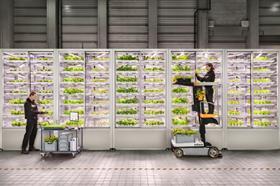
Urban farming network Infarm has announced a US$170m investment raised in the first close of a Series C funding round expected to reach US$200m.
Led by LGT Lightstone, the first round included participation by investors Hanaco, Bonnier, Haniel, and Latitude and was supported by existing Infarm investors Atomico, TriplePoint Capital, Mons Capital and Astanor Ventures.
With a mix of equity and debt financing, the fresh capital infusion brings Infarm’s total funding to date to more than US$300m, underscoring consumer and retailer appetite for Infarm’s approach to fresh, sustainable and local food production in the wake of this year’s Covid-19 pandemic.
By 2025, Infarm’s farming network is expected to reach more than 5m square feet to become the largest distributed farming network in the world as it builds towards helping cities become self-sufficient in their food production.
According to Infarm, the investment will be used to deepen the regional and local penetration of Infarm’s global farming network and complete development of Infarm’s new generation of vertical cloud-connected farms, capable of generating the crop-equivalent of acres of farmland and amplifying the diversity of produce currently available through vertical farming.
An integration of advanced engineering, software and farming technology, these farms will save labour, land, water, energy, and food miles, while contributing to a more sustainable food system, the group noted.
“The coronavirus pandemic has put a global spotlight on the urgent agricultural and ecological challenges of our time,' said Erez Galonska, co-founder and chief executive of Infarm. 'At Infarm, we believe there’s a better, healthier way to feed our cities: increasing access to fresh, pure, sustainable produce, grown as close as possible to people.
'As we scale to 5m ft2 in farming facilities across Europe, North American and Asia by 2025, this investment will help us make a truly global impact through our network, preserving the thousands of acres of land, millions of litres of water and ultimately change the way people grow, eat and think about food.”
In the past 12 months, Infarm has formed new partnerships with retailers including Albert Heijn (Netherlands), Aldi Süd (Germany), COOP/Irma (Denmark), Empire Company Ltd (Sobeys, Safeway, Thrifty Foods - Canada), Kinokuniya (Japan), Kroger (United States), Marks & Spencer (United Kingdom) and Selfridges (United Kingdom).
With operations across 10 countries and 30 cities worldwide, Infarm harvests over 500,000 plants monthly and growing while using 99.5 per cent less space than soil-based agriculture, 95 per cent less water, 90 per cent less transport and zero chemical pesticides.
Today, 90 per cent of electricity use throughout the Infarm network is from renewable energy and the company has set a target to reach zero emission food production next year.
“We are excited to partner with the Infarm team to accelerate their urban vertical farm vision, ultimately creating a more sustainable food system for a growing population, explained Dharmash Mistry, partner of LGT Lightstone. 'Fresher, tastier and healthier food using 95 per cent less land and water, no pesticides and 90 per cent less transport.
'With over US$1bn of customer demand, partnerships with 17 of the top 50 global grocers, Infarm is set to revolutionise the market behind a unique ‘demand led’ modular business model. We look forward to working with Erez, Guy and Osnat to create a better, healthier and tastier future.”
Founded in Berlin in 2013 by Osnat Michaeli and the brothers Erez and Guy Galonska, Infarm is dedicated to creating a future where local super fresh produce is available for everyone.
The farms are placed in various locations in the city, like supermarkets, restaurants and distribution centres, so that vegetables grow and are harvested close to the moment of purchase or consumption.
These controlled, growing environments are connected to a central cloud-based farm-brain which gathers more than 50,000 data points through a plant’s lifetime, allowing the platform to learn, adapt and improve itself constantly, so that every plant grows better than the one before.
This modular, data-driven, and distributed approach – a combination of big data, IoT, and cloud analytics, in addition to rapid growth at a global scale – 'sets Infarm apart from any other urban farming solution'.






No comments yet